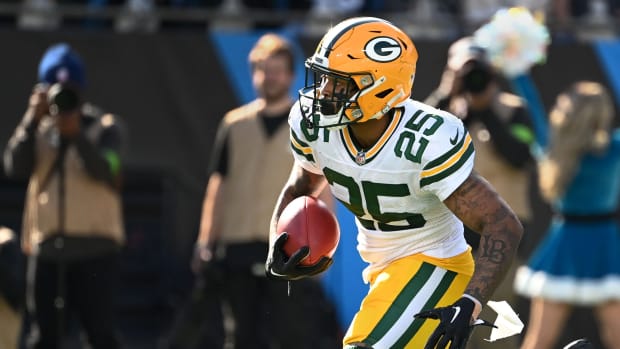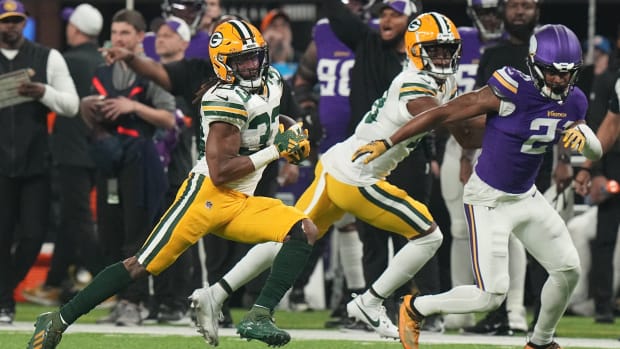‘One Out of Five’ Isn’t a Trend
GREEN BAY, Wis. – Through four games, the Green Bay Packers had one of the most prolific offenses in NFL history.
In Game 5, last week at Tampa Bay, the Packers continued their red-hot start to the season by scoring 10 points in the first quarter.
Then, the offensive magic went poof. Green Bay, with no running game to speak of and a pair of game-changing interceptions by Aaron Rodgers, failed to even cross midfield during the final three quarters of a 38-10 loss.
The very notion that defenses have perhaps figured out how to unplug the Packers’ offensive machine irked Rodgers.
“One out of five,” Rodgers said.
Rodgers, of course, is right. One game doesn’t make a trend. A perfect example came in 2014. After getting smacked by the Saints before the bye, the Packers entered the second half of the season with a 5-3 record. The Packers exited the bye with five consecutive victories, including a game of 55 points against Chicago, 53 against Philadelphia and 43 against Atlanta, with a huge win over the Tom Brady- and Bill Belichick-led Patriots sandwiched in between.
Now, for the parallel. The Packers lost at Buffalo 21-13. To this date, it remains Rodgers’ lowest passer rating in a game he started and finished.
That one loss to a mediocre team – Buffalo finished 9-7 – wasn’t the start of a trend. The Packers won their next three games to advance to the NFC Championship Game.
So, while the outside world acts like “Chicken Little” – those were Rodgers’ words in recalling the 2012 season, when the Packers started 2-3 but crushed the undefeated Houston Texans in prime time to silence the critics – the Packers have turned the page for Sunday’s game at, oddly enough. Houston.
That’s because that’s what athletes do. Coach Matt LaFleur loves to talk about pressing “the reset button.” That reset is ingrained in football players, who have lived by a weekly routine for years. After all, while Rodgers was asked several questions about what happened last week, he had just come off the field following a practice dedicated to installing this week’s game plan.
“The most important thing is to stick to the process and the plan and the routine,” Rodgers said. “We are creatures of habit, and it’s important to move forward. By the time we watched that film on Monday, that’s in the can. We’re on to the next opponent. The last two days, we’ve been watching Houston. We’ve been talking about Houston. We’re on to the next situation. The biggest thing that we can do is just focus on what got us here and this opponent.
“I think it’s a good reminder for us, like I talked about yesterday [on the “Pat McAfee Show”], that we can’t ride this rollercoaster of feeling ourselves and reading all the clippings if it’s going great and then down in the dumps and not reading anything and feeling sorry for ourselves when we get beat like that. You have to get off the surfboard and get off that wave because this is a long season and you have to find the process of preparation that works for you and move forward.”
This coming Sunday, not next Sunday, was Adams’ focus, as well. While the media wonders if the Packers are paper tigers and many fans wonder if the Packers were exposed, Adams said he’s not concerned about the “outside noise” in the wake of an ugly loss.
“Obviously, you’ll be upset because of what we expect from ourselves so, obviously, guys will be upset at the outcome or how we played or how we executed,” he said. “We’re not trying to do it for anybody on the outside. It’s not like, ‘Oh, we want to shut the critics up so we’re going to go out there and play a good game.’ That’s never been the mentality of this team.
“We want to obviously do this (has hand pointed up) as the season goes on. You don’t want to live in this world (has hand moving up and down) because, when you start worrying about the outside, then you mess up during a game and that’s where your mind is rather than being about fixing the issue and getting ready for the next play. We’ve got that next-play, next-snap, next-game mentality, and that’s the way to go about it.”




